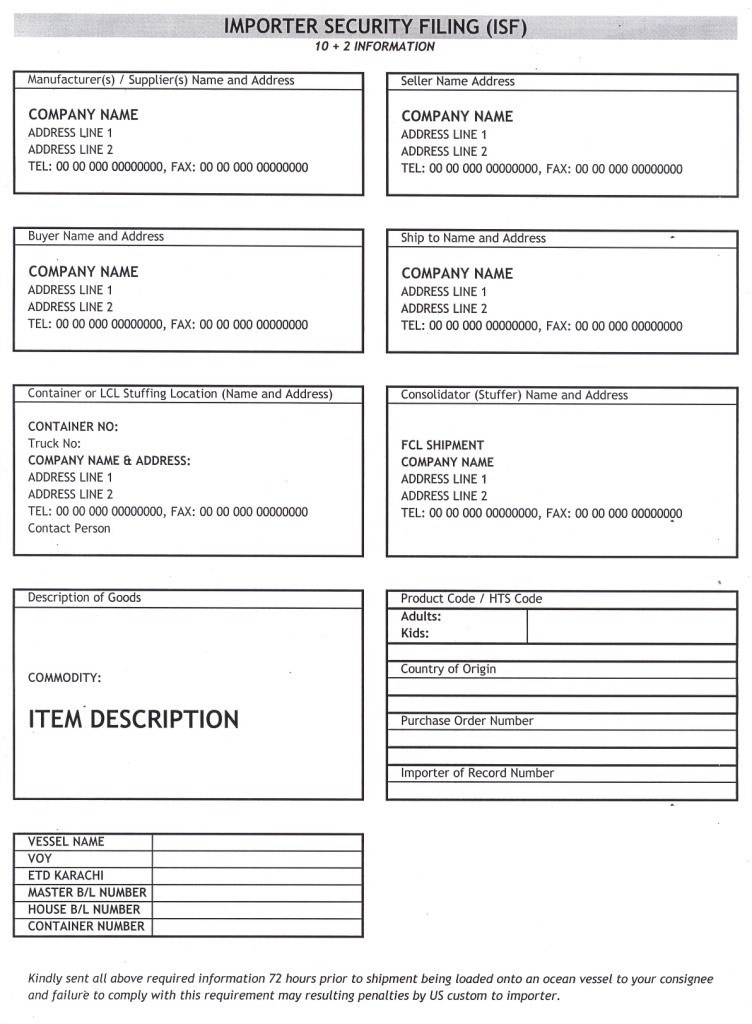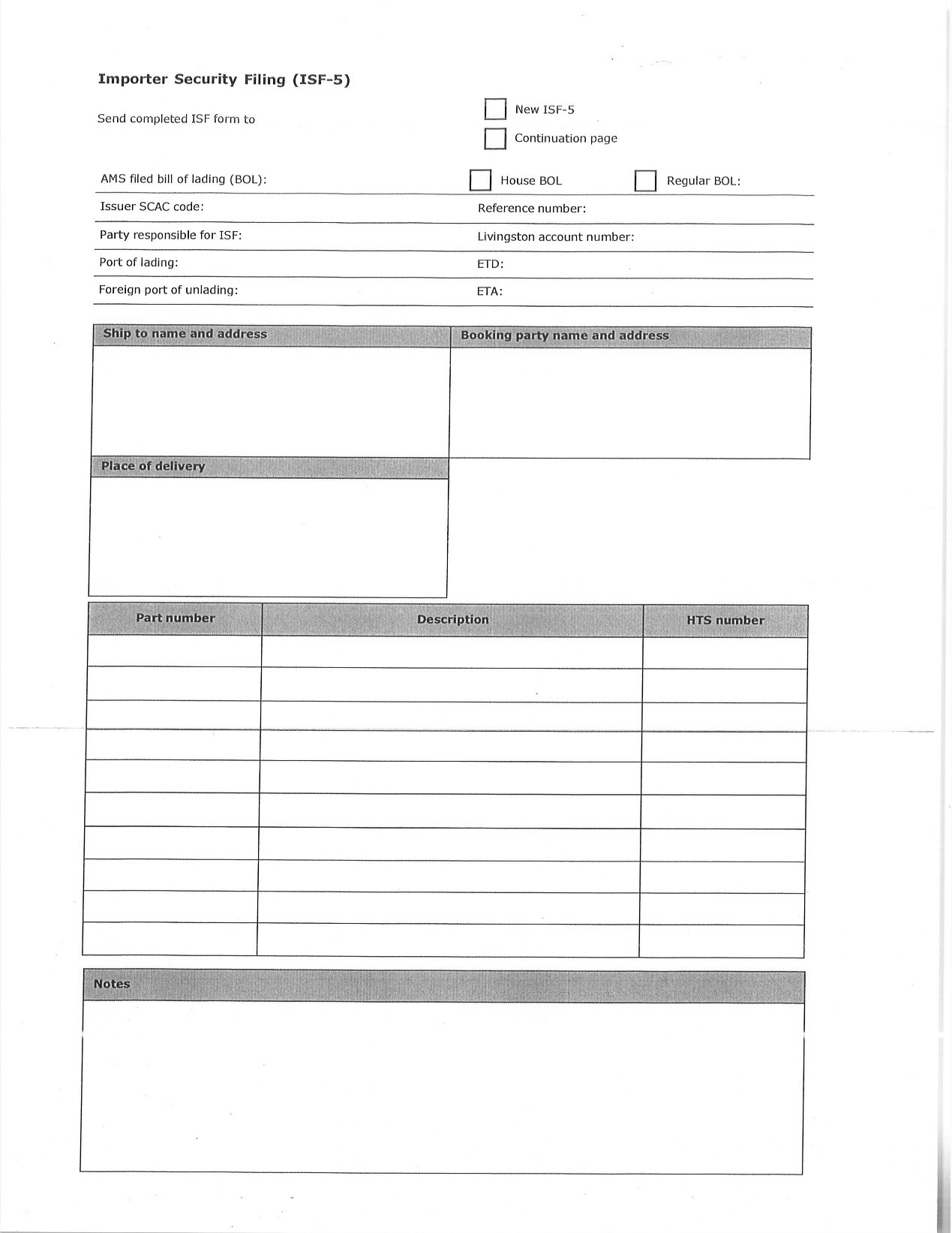
[DETROIT, MI– DECEMBER 7th, 2021]
ISF- Importer security filing
ISF stands for Importer security filing, there are two types of ISF that the importer should be aware of, ISF “10+2” and ISF 5, the ISF filing are requirement by the CBP that documents importing information and details as shipments pass from point to point. The requirement to file ISF 10+2 started January 2009 and ISF 5 started March of 2019, and the reason being to enhance security for sea and ocean shipments. The ISF allow CBP and the Department of Homeland Security to identify high-risk shipments to prevent smuggling and provide enhanced cargo security and safety. The difference between these two ISF is, that the 10+2 is to be filed when the shipment is coming into a U.S port and will be delivered to a party in the U.S. The ISF5 is too filed if a shipment is coming into a U.S port and either is staying on the ship to be delivered to a foreign port, or will be taken as a TE or IE shipment and will be taken out the country.
An ISF must be filed 24 hours before the ship departs, it is recommended the ISF be filed a few days before departure and not last minute. The ISF must filed against the lowest bill of lading number either the house or regular bill that is referenced in AMS on the electronic manifest. All ISF filings are to be done electronically. One ISF can cover multiple bills as long as they are part of the same shipment going to the same importer of record and arriving on the same vessel/voyage
The party that is responsible for fling the ISF is called the ISF importer, this being the party causing the goods to arrive within the limits of a port in the United States by a vessel, the ISF importer is generally the goods owner, purchaser, consignee, or agents such as a licensed custom broker.
Failure to file can lead to CBP to assess damage up to $10,000 for failure to comply, CBP can also fine you for late failing, incomplete filing, failure to withdraw the ISF, or failure to ensure it matches the bill of landing that is on file, any of these mistakes can lead to $5,000 in fines per shipment.
To avoid receiving a penalty, the importer should always make sure that the ISF importer has been given the necessary information. The information should be presented to the ISF importer as below. The first form is a standard 10+2 form that has the 10 data unit that are needed to correctly file an ISF bond. The second form is the ISF5 which has 5 data units that must be reported. Once the ISF importer has confirmed the ISF filing, the importer should always request a copy of the ABI notes, to confirm that the ISF has been filed correctly.
ISF FORM - EXAMPLE

Canadian International Merchandise Trade Web Application: The application offers detailed commodity trade data for Canadian importers and exporters.
Port of Vancouver Operations Update: The Vancouver gateway is experiencing significantly disrupted rail and truck movement due to widespread flooding throughout the Metro Vancouver and Fraser Valley regions. Flooding impacts on highways remain severe and widespread throughout southwestern B.C.
CBP and CBSA Joint Updated Emergency Protocols in Response to Flood Situation in British Columbia, Canada: Adhering to these measures will facilitate crossing and decrease delay at the border that will be caused by these temporary emergency measures.
Air Cargo, up 9.1% in September, Capacity Remains Constrained: The International Air Transport Association (IATA) released September 2021 data for global air cargo markets showing that demand continued to be well above pre-crisis levels and that capacity constraints persist.
LA/Long Beach ports delay excess container dwell fees until Nov. 29: The ports of Los Angeles and Long Beach for a second time have postponed collection of a new surcharge on long-dwelling containers, saying progress by ocean carriers and shippers has reduced the amount of aging containers on the docks by a third.
OECD: International trade continued to expand in the G20 in Q3 2021, as services pick up but merchandise trade growth slows: G20 merchandise trade growth in value terms saw a marked slowdown in the third quarter of 2021, albeit levels remain at record high partly reflecting strong commodity prices. Surging shipping costs and a recovery in travel spurred faster growth in trade in services, with exports for the G20 nearing 2019 levels.
U.S. International Trade in Goods and Services, September 2021: The U.S. Census Bureau and the U.S. Bureau of Economic Analysis announced today that the goods and services deficit was $80.9 billion in September, up $8.1 billion from $72.8 billion in August, revised.
Get in touch with us!
4444 Wyoming Ave. Detroit, Michigan 48216 | Phone: 313-965-8299 | Fax: 313-965-7399
For more information on Cavalry Logistics International, please visit www.shipwithU.com/international.
For more information on Universal Logistics Holdings, Inc., visit www.universallogistics.com.


